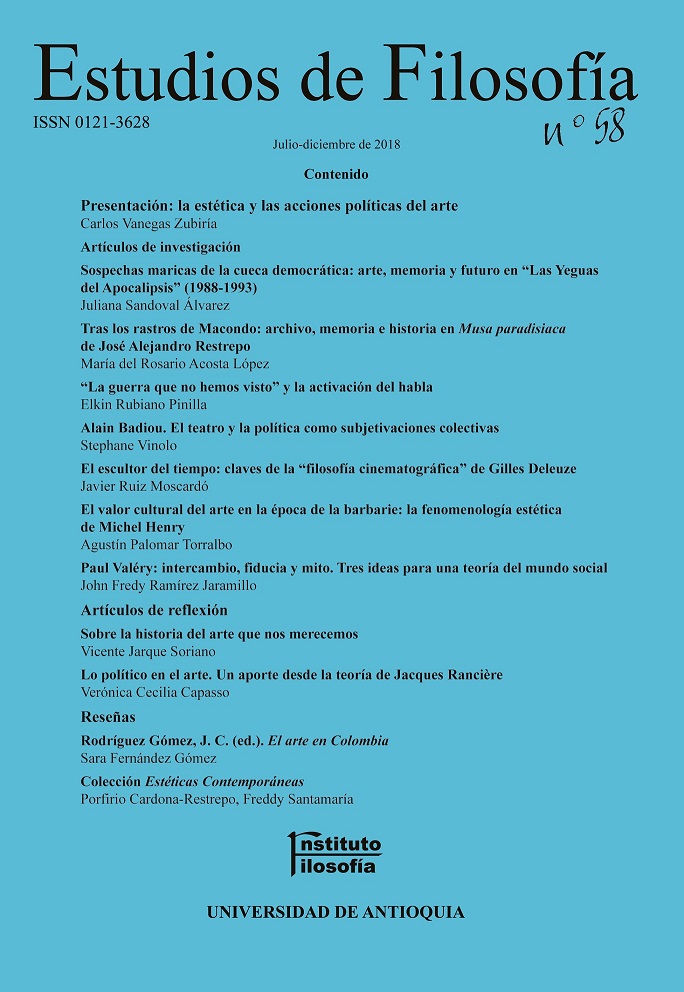Alain Badiou. Theatre and politics as collective subjectivations
DOI:
https://doi.org/10.17533/udea.ef.n58a05Keywords:
Alain Badiou, dialectics, politics, subject, theatre, truthAbstract
Since the Greek emergence of philosophy, theatre and politics maintained complicated but close links. In their own way, both seek to unify multiplicities through the localized interweaving of ideas and bodies. Overcoming the Platonic, Aristotelian and Heideggerian models of the relationship between art and philosophy, it is shown with Badiou that the contemporary articulation of theatre and politics lies within a dialectical game that constitutes the collective Subject of both elds. For this purpose, it is necessary to rethink the point of contact between theatre and politics in the light of their different production of truths. Relocating the truth at the centre of both activities, it is possible to unveil with Badiou that both contemporary theatre and politics contribute to the creation of faithful Subjects when the collective is built through the indifference to the differences. Thus, beyond the fact that theatre and politics can be objects of one another, and that they inhabit each other, theatre reveals what can still be, today, the only real and true politics.
Downloads
References
Badiou, A. (1990). Manifiesto por la filosofía. Buenos Aires: Nueva visión.
Badiou, A. (1999). El ser y el acontecimiento. Buenos Aires: Manantial.
Badiou, A. (2008a). ¿Qué representa el nombre de Sarkozy? Vilaboa: Ellago.
Badiou, A. (2008b). Lógica de los mundos, El ser y el acontecimiento 2. Buenos Aires: Manantial.
Badiou, A. (2009a). Pequeño tratado de inestética. Buenos Aires: Prometeo.
Badiou, A. (2009b). Teoría del sujeto. Buenos Aires: Prometeo.
Badiou, A. (2010a). Segundo manifiesto por la filosofía. Buenos Aires: Manantial.
Badiou, A. (2010b). La trilogie d’Ahmed. Arles: Actes Sud.
Badiou, A. (2011). Elogio del amor. Madrid: La esfera de los libros.
Badiou, A. (2014). Rhapsodie pour le théâtre. Paris: Presses Universitaires de France.
Badiou, A. (2015). Elogio del teatro. Buenos Aires: Ediciones Nueva Visión.
Badiou, A. (2016). La vraie vie. Fayard: Paris.
Badiou, A. & Tarby, F. (2010). La philosophie et l’événement. Paris: Germina.
Cavell, S. (1979). The world view, Reflections on the ontology of film. Boston: Harvard University Press.
Deleuze, G. (1981). Logique de la sensation. Paris: Éditions de la Différence.
Derrida, J. (1978). La vérité en peinture. Paris: Flammarion.
Dumont, P. (1997). Descartes et l ́esthétique, l ́art d ́émerveiller. Paris: PUF.
Dupont, F. (2007). Aristote ou le vampire du théâtre occidental. Paris: Aubier Montaigne.
Guenancia, P. (2012). Descartes et l ́ordre politique: Critique cartésienne des fondements de la politique. Paris: Gallimard.
Heidegger, M. (2006). El origen de la obra de arte. O cina de arte y ediciones: Madrid.
Marion, J. (2008). Siendo dado, ensayo para una fenomenología de la donación. Madrid: Síntesis.
Marion, J. (2010). Certitudes négatives. Paris: Grasset.
Marion, J. (2014). Courbet, ou la peinture à l ́œil. Paris: Flammarion.
Meyer, M. (2005). Le comique et le tragique: Penser le théâtre et son histoire. Paris: PUF.
Platón. (1986). República. En Diálogos, IV. Madrid: Gredos.
Sartre, J–P. (1943). L’être et le néant, Essai d’ontologie phénoménologique. Paris: Gallimard.
Sartre, J–P. (1963). Crítica de la razón dialéctica, Tomo 1, Teoría de los conjuntos prácticos. Buenos Aires: Losada.
Tocqueville, A. (1996). El Antiguo Régimen y la Revolución. México: Fondo de cultura económica.
Vinolo, S. (2012). Ces fantômes qui donc nous gouvernent. The International Journal of Badiou Studies, 1(1), 1–17.
Vinolo, S. (2014). Alain Badiou – Vivre en immortel. Paris: L'Harmattan.
Vinolo, S. (2016). Le don de Spinoza à la phénoménologie de Jean-Luc Marion. Laval théologique et philosophique, 72(2), 299–317.
Yvonnet, F. (2012). Homo comicus ou l’intégrisme de la rigolade. Paris: Mille et une nuits, Paris.
Published
How to Cite
Issue
Section
Categories
License
Copyright (c) 2018 Stephane Vinolo

This work is licensed under a Creative Commons Attribution-NonCommercial-ShareAlike 4.0 International License.
Authors who publish with this journal agree to the following terms:
1. The Author retains copyright in the Work, where the term "Work" shall include all digital objects that may result in subsequent electronic publication or distribution.
2. Upon acceptance of the Work, the author shall grant to the Publisher the right of first publication of the Work.
3. The Author shall grant to the Publisher a nonexclusive perpetual right and license to publish, archive, and make accessible the Work in whole or in part in all forms of media now or hereafter known under a Creative Commons Attribution-NoCommercia-ShareAlike (CC BY-NC-SA 4.0), or its equivalent, which, for the avoidance of doubt, allows others to copy, distribute, and transmit the Work under the following conditions: (a) Attribution: Other users must attribute the Work in the manner specified by the author as indicated on the journal Web site;(b) Noncommercial: Other users (including Publisher) may not use this Work for commercial purposes;
4. The Author is able to enter into separate, additional contractual arrangements for the nonexclusive distribution of the journal's published version of the Work (e.g., post it to an institutional repository or publish it in a book), as long as there is provided in the document an acknowledgement of its initial publication in this journal;
5. Authors are permitted, and Estudios de Filosofía promotes, to post online the preprint manuscript of the Work in institutional repositories or on their Websites prior to and during the submission process, as it can lead to productive exchanges, as well as earlier and greater citation of published work (see The Effect of Open Access). Any such posting made before acceptance and publication of the Work is expected be updated upon publication to include a reference to the Estudios de Filosofía's assigned URL to the Article and its final published version in Estudios de Filosofía.















